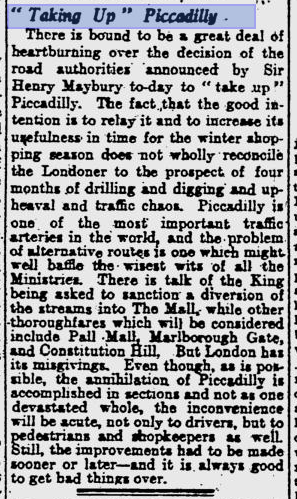Good day. I've been reading 'Short works of Lord Dunsany' for this morning. Among the short stories I've read one. Fortunately I found it through internet. it follows below.
*George P. Landow created this formatted version of The Book of Wonder, which was first oublished in 1915, using the Project Gutenberg text produced by Anne Reshnyk, Suzanne L. Shell, Charles Franks and the Online Distributed Proofreading Team.
Going down Piccadilly one day and nearing Grosvenor Place I saw, if my memory is not at fault, some workmen with their coats off--or so they seemed. They had pickaxes in their hands and wore corduroy trousers and that little leather band below the knee that goes by the astonishing name of "York-to-London." They seemed to be working with peculiar vehemence, so that I stopped and asked one what they were doing.
"We are taking up Piccadilly," he said to me.
"But at this time of year?" I said. "Is it usual in June?"
"We are not what we seem," said he.
"Oh, I see," I said, "you are doing it for a joke."
"Well, not exactly that," he answered me.
"For a bet?" I said.
"Not precisely," said he. And then I looked at the bit that they had already picked, and though it was broad daylight over my head it was darkness down there, all full of the southern stars.
"It was noisy and bad and we grew aweary of it," said he that wore corduroy trousers. "We are not what we appear." They were taking up Piccadilly altogether.*
Here is my question. I don't fully understand what 'taking up Picadilly' means. Is it idiom used in Britain? Please let me know the meaning of this.

